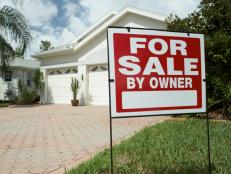How to Recession-Proof Your Home Purchase
While you can't change market conditions, you can protect your investment and recession proof your home purchase. Even if it may be years before you need to sell, it’s never too early to start thinking about what the house will be worth five, 15, even 30 years from now. Here’s a list of things that add value to a home, plus a few things to avoid that may reduce the asking price of a property:
Consider Cul-de-Sacs: A cul-de-sac, commonly used to minimize traffic in suburban neighborhoods across the United States, can be an asset for homebuyers. The neighborhood-y feel can be an attractive incentive for future sales, but here's where the mantra location, location, location comes in. If you're house hunting in a metropolitan area, the cul-de-sac may be a poor choice for buyers. The reason: In metro areas, walkability and the closeness to public transportation may be an important factor for retaining home value.
Avoid Highways or Busy Streets: Homebuyers should be wary of homes that are too close to the highway or experience heavy traffic. A home that's a hop, skip and a jump from the interstate may seem like a gem for buyers with long commutes looking for easy access to the roads, but noise level and even safety concerns can bring down a home’s value. This is what we call "built-in obsolesce," says Valerie Torelli, founder of Torelli Realty in Orange County, Calif. "You can never move a house off the highway."
Consider a Home with Land: Another asset for homeowners is "larger-than-normal lot sizes," says Torelli. "Buy land -- they don't make it anymore," says Torelli. It's as simple as that. Limited earth resources mean land ownership will always be a valuable resource.
Avoid Homes with Stigmas: If a seller is offering you a good price on a home where a crime -- say, a homicide -- has taken place, that's a social stigma that can decrease your home’s value. For this reason, even if it seems like a sweet deal, you might want to avoid a home with a large enough stigma to affect your ability to sell.
Consider Design: Like high art, the appearance and uniqueness of a home’s design are appealing qualities that can not only add personality, but can also add value to a home. The single-family home or condo with an artist's loft or nanny's quarters are just two unique attributes that can make your home purchase stand out.
Avoid the Unusual Layout: Children love mazes, but an unusual floor plan that doesn't flow might not be worth the investment, unless it's a home you plan on staying in forever. "If you have to have something that is so unique, always ask yourself, 'Who is going to buy me out of the house?’" says Torelli.
Consider the Home’s Condition: The question every homebuyer should ask themselves when shopping for the perfect house is "how much is it going to cost me to own this home?" says Kathleen Kuhn, president of home inspection company Housemasters. That means looking beyond the price tag of the house. This is "where the condition of the home really factors into the price of owning the home," says Kuhn. A leaky roof, cracked foundation or anything that must be replaced adds to the total cost of the home. Look at the appliances: Energy Star kitchen equipment can not only help you save on monthly bills, but can also be a huge bonus if your home is ever on the market.
Avoid Expensive Replacements: If you're looking at a home with antiquated systems that need to be replaced, you have to add thousands of dollars to the price of the house. A property's condition, not just its price, is the true measurement of how much it's worth. If you're getting a good deal on a home, but must spend $10,000 to $25,000 replacing old or faulty equipment, is the house worth the price?
Consider a Home Inspection: For anywhere from $300 to $500 (a bit more for larger homes), you can hire a professional home inspector to conduct a thorough review of the property's condition. In addition to revealing the home's flaws, the resulting report lists positive attributes, such as whether a home is well-insulated, if the house has programmable thermostats, a new single-layer roof, new windows or any new major systems that are a bonus, says Kuhn.
Avoid a Depressed Area: Detroit is the perfect example of a city reeling from a depressed market. The price of a foreclosed home may be tempting, but is it really a deal? Remember, it's hard to recession proof a home on a block filled with foreclosed properties.
Buying a house is a huge investment and it's important to protect yourself. But in the end, you're really looking for a place you want to call home. So as you attend open houses and look at homes for sale, remember that while losing value in your home is a scary prospect, it shouldn't keep you from finding a place that'll make you happy.














































